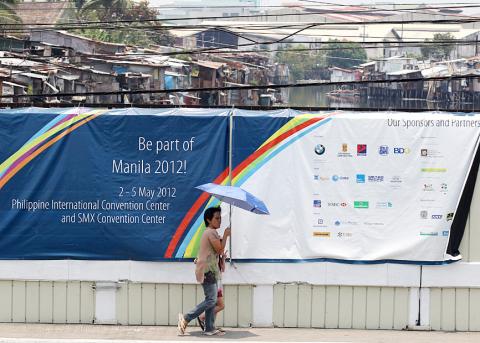Delegates attending an international conference in the Philippine capital might not see what they came to discuss: abject poverty.
A makeshift, temporary wall has been erected across a bridge on a road from the airport to downtown Manila that hides a sprawling slum along a garbage-strewn creek.
Presidential spokesman Ricky Carandang defended the wall’s installation, saying yesterday “any country will do a little fixing up before a guest comes.”

Photo: EPA
He expressed hope that this week’s annual meeting of the Asian Development Bank (ADB) Board of Governors, which includes finance ministers and senior officials from 67 member states, will show the Philippines is open for business. The lending institution, which is headquartered in its own walled compound in Manila, aims to cut poverty in the Asia-Pacific region.
“We need to show our visitors that Metro Manila is orderly. We owe it to ourselves,” Metro Manila chief Francis Tolentino said. “I see nothing wrong with beautifying our surroundings. We are not trying to keep the poor out of the picture.”
There was no immediate comment from ADB.
The Philippine Communist Party recalled that former Philippine first lady Imelda Marcos — notorious for living an ostentatious lifestyle — was ridiculed for trying to hide squatter colonies. She erected similar whitewashed walls along the route of foreign visitors to the Miss Universe pageant in Manila in 1974, and other international events.
“The government should face reality. If they don’t, how will they know the problem, how will they solve the problem?” asked Renato Reyes, secretary general of the largest left-wing group Bayan. “By covering the truth, they lose the energy or intention to resolve the problem.”
About a third of Manila’s 12 million residents live in slums, and a third of 94 million Filipinos live below the poverty line of US$1.25 a day. Overall, more than half the population in Asia remains poor.

Incumbent Ecuadoran President Daniel Noboa on Sunday claimed a runaway victory in the nation’s presidential election, after voters endorsed the young leader’s “iron fist” approach to rampant cartel violence. With more than 90 percent of the votes counted, the National Election Council said Noboa had an unassailable 12-point lead over his leftist rival Luisa Gonzalez. Official results showed Noboa with 56 percent of the vote, against Gonzalez’s 44 percent — a far bigger winning margin than expected after a virtual tie in the first round. Speaking to jubilant supporters in his hometown of Olon, the 37-year-old president claimed a “historic victory.” “A huge hug

Two Belgian teenagers on Tuesday were charged with wildlife piracy after they were found with thousands of ants packed in test tubes in what Kenyan authorities said was part of a trend in trafficking smaller and lesser-known species. Lornoy David and Seppe Lodewijckx, two 19-year-olds who were arrested on April 5 with 5,000 ants at a guest house, appeared distraught during their appearance before a magistrate in Nairobi and were comforted in the courtroom by relatives. They told the magistrate that they were collecting the ants for fun and did not know that it was illegal. In a separate criminal case, Kenyan Dennis

A judge in Bangladesh issued an arrest warrant for the British member of parliament and former British economic secretary to the treasury Tulip Siddiq, who is a niece of former Bangladeshi prime minister Sheikh Hasina, who was ousted in August last year in a mass uprising that ended her 15-year rule. The Bangladeshi Anti-Corruption Commission has been investigating allegations against Siddiq that she and her family members, including Hasina, illegally received land in a state-owned township project near Dhaka, the capital. Senior Special Judge of Dhaka Metropolitan Zakir Hossain passed the order on Sunday, after considering charges in three separate cases filed

APPORTIONING BLAME: The US president said that there were ‘millions of people dead because of three people’ — Vladimir Putin, Joe Biden and Volodymyr Zelenskiy US President Donald Trump on Monday resumed his attempts to blame Ukrainian President Volodymyr Zelenskiy for Russia’s invasion, falsely accusing him of responsibility for “millions” of deaths. Trump — who had a blazing public row in the Oval Office with Zelenskiy six weeks ago — said the Ukranian shared the blame with Russian President Vladimir Putin, who ordered the February 2022 invasion, and then-US president Joe Biden. Trump told reporters that there were “millions of people dead because of three people.” “Let’s say Putin No. 1, but let’s say Biden, who had no idea what the hell he was doing, No. 2, and